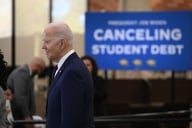You have /5 articles left.
Sign up for a free account or log in.
"Free" has been the higher education buzzword of the year, as Democrats have proposed a range of plans to infuse billions of federal dollars into public institutions to lower tuition to zero or close to zero.
But as politicians pitch debt-free and tuition-free college, some are also pushing another narrative: that they expect students to work in exchange for those new benefits.
President Obama included rhetoric about work in his proposal for free community college, saying he wanted to offer the benefit only to those students "willing to work for it." But the president's proposal focused more on academic work, calling for requiring students to maintain a 2.5 GPA in order to be eligible for free tuition at a community college.
Hillary Clinton has adopted nearly identical language in pitching her college affordability plan, though it represents a very different kind of work. "We need to make a quality education affordable and available to everyone willing to work for it," she said in August.
Clinton is proposing that students work 10 hours a week in order to receive debt-free tuition at public colleges and universities. And she has been using that component to distinguish her plan from that of her rival for the Democratic presidential nomination, Vermont Independent Senator Bernie Sanders, with whom she will square off during the first Democratic debate on Tuesday evening.
Clinton last week implicitly knocked Sanders's plan for providing benefits to wealthy students who don't need them. And she was quick to add, "I worked when I went to college. I had a job. I went to law school, I had a job …. If you are willing to work 10 hours a week at your college, you should get extra help."
Sanders has responded to such criticism by pointing out that his plan, which would make all students at public institutions eligible for free tuition regardless of whether they work during college, is a simpler way to tackle college affordability.
"We disagree on our college plans." Sanders said of Clinton on MSNBC last week. "I think mine is more simple and straightforward, providing free tuition at public colleges and universities."
Although Sanders's tuition-free college plan does not have a direct work requirement, he has called for increasing funding for the federal work-study program. His proposal would also overhaul that program so that it benefits more low-income students, according to his office.
The emphasis on getting students to work in exchange for aid to attend college isn't new.
“The idea that students should work their way to an education has always been popular” from the very beginning of federal student aid programs, said Christopher P. Loss, assistant professor of public policy and higher education at Vanderbilt University.
“It’s a way to sort of stave off the accusation or criticism that it’s just one more big government handout for a potentially undeserving population of students who aren’t really that invested in their own education,” he said. “There’s a long history of trying to tie subsidies of these sorts to some sort of work requirement.”
But as politicians call on students to chip in for their education by working, some observers pointed out that the majority of students already are.
“There are political advantages to saying we’re not going to provide aid to students who aren’t putting in the effort for their education,” said Mark Huelsman, a policy analyst at Demos, a think tank that has been promoting debt-free college. “No one ever lost an election by criticizing the work ethic of today’s youth.”
Still, Huelsman said that Clinton’s inclusion of a 10-hour-a-week work requirement for students in her debt-free tuition plan may actually operate as a cap on work for most students rather than a new requirement. That’s because most students are already working far more hours, he said.
Huelsman also notes that “there are some policy advantages to encouraging a modest amount of work.”
Some research has found that students who work some amount during college -- roughly between 10 and 15 hours a week -- tend to have higher completion rates. Other research has found that students who participate in the federal work-study program are more likely to graduate and get jobs after college, though they also tend to take out loans to attend college.
“Work requirements are definitely good politics,” said Robert Kelchen, an assistant professor of education leadership, management and policy at Seton Hall University. “Are they good policy? It depends on the kind of work.”
In some cases, Kelchen said, requiring full-time students to work may clash with efforts to encourage them to load up on 15 credits a semester so they graduate on time.
Beyond the federal proposals, many states have adopted work requirements in their free community college initiatives or other state aid programs. For instance, Tennessee’s community college program, which served as a model for Obama’s proposal, requires students to complete some community service during high school in order to be accepted. Elsewhere, many state lottery scholarships require students to maintain minimum academic standards to receive that aid.








